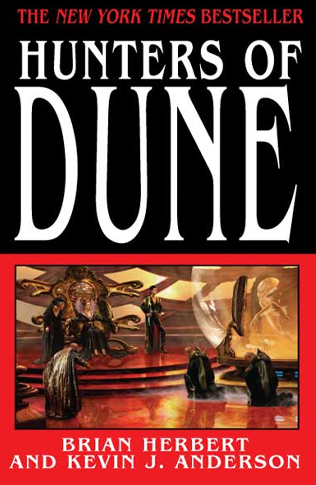
Brian Herbert and Kevin J. Anderson – Hunters of Dune
Tor, 2006, 524pp, $27.95, 0-765-31292-1
After many years and two prequel trilogies we reach Dune 7, the series finale and direct sequel to Chapterhouse: Dune based on detailed notes left by Frank. A group of refugees led by the latest Duncan Idaho are fleeing the Honored Matres (evil and generally not very bright counterparts to the Bene Gesserit) and the unnamed Enemy that approaches the former empire. A New Sisterhood is evolving from the fusion of more forward-thinking Honored Matres and Bene Gesserit which will be the only viable opposition to the Enemy when it arrives. Face Dancers in the knowing or unknowing service of the Enemy are infiltrating everywhere; and the Guild is splitting between its Administrators, who just want the Guild to do its job and get ships from A to B, never mind how, and the Navigators, who will do anything for spice, sod the actual Navigating.
It’s easily readable, which puts it well ahead of Dunes 2-6. One of the authors has quite a neat turn of phrase, making up for the other who writes like a sixth former (you can picture the ghosts of the !!!s he must have wanted to put at the end of sentences in the strangely unengaging action scenes). What it doesn’t do, sadly, is really give you a reason to read it, unless you’re a Dune completist.
There are (of course) multiple story lines, each told in snippets of 3-4 pages on average, which makes for bittiness. Many of these turn out to be dead ends as characters die or are otherwise neutralised with no discernible plot impact. Key events like the obliteration of an entire world are over almost before you notice – if you turned two pages by accident, you would miss it. Eventually the story picks up as all the threads come together, the entire original cast are reincarnated as gholas, and a trap is sprung that almost ensnares our heroes. We learn who the Enemy is (thereby learning the reason for those prequel trilogies, though the Enemy’s origins story has been done before) and we’re all set up for Dune 7b. Finally. Yes, I should have mentioned that this is actually Dune 7a, as the authors decided two volumes were needed to do the story justice. The original Dune had no difficulty with being quite long, covering a similar time period and never letting up the action – you can’t help wondering why they couldn’t do likewise here and just give us one volume. Gee, I wonder.
And mentioning the original Dune highlights the book’s key weakness, which is the lack of Dune. It’s unavoidable as Arrakis was destroyed at the end of Heretics of Dune – but the sheer Duneness of Dune was such a massive presence that you were prepared to forgive its weaknesses. Without Dune or an equivalent to distract us from the logical absurdities of galactic empire, ships the size of cities, the technological dead-end of spice, plot-device genes that block you from the visions of seers, psychotic sisterhoods in tight leotards etc, we have no reason to suspend our disbelief and the whole thing comes across as a bit … well, silly.
Nor is there anyone you can really like or care about. The adult characters are stuffed shirts. The gholas are still children. There are two versions of Paul (presumably the home-ghola and the away-ghola) but it’s young Vladimir Harkonnen, with his sheer delight in making evil personal, who shows the most signs of being fun. Fun – that’s what’s missing.
